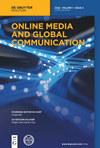2019年和2021年的新闻曝光和美国人对中国的看法
引用次数: 0
摘要
摘要目的近年来,中美关系一直处于自由落体状态。新冠肺炎疫情和中美贸易战加剧了美国公众对中国的负面看法。本研究分析了2020年新冠肺炎疫情前后美国人的新闻消费和个人特征如何影响他们对中国的总体看法,以探讨重大国际事件如何影响人们对外国的看法。本研究依赖于2019年初(N = 1250)和2021年(N = 1237)在美国进行的两项全国性在线调查的数据。这两项调查都考察了受访者的媒体使用情况、个人特征以及他们对中国的看法。研究结果表明,对中国的看法主要是由党派和社交媒体的曝光而不是主流新闻媒体的消费所塑造的。然而,这些关系在2021年明显强于2019年,这表明美国新闻媒体在美中关系中的影响力越来越大。这项研究还发现,党派关系和个人特质是美国人对中国态度的有力预测因素。研究人员可以从这项研究中了解到,哪些变量应该包括在关注公众对外交事务看法的调查中。本研究表明,媒体效应和个人特征以复杂的方式相互作用,塑造了美国人对中国的看法。独创性/价值本研究分析和比较了两个国家代表性样本的数据,为重大国际事件如何影响公众舆论提供了见解。它还衡量了中国社交媒体平台TikTok对美国人对中国的看法可能产生的影响。本文章由计算机程序翻译,如有差异,请以英文原文为准。
News exposure and Americans’ perceptions of China in 2019 and 2021
Abstract Purpose The relationship between China and the United States has been in freefall in recent years. Both the Covid-19 pandemic and the U.S.-China trade war contributed to more negative perceptions of China among the American public. This study analyzes how Americans’ news consumption and personal traits affected their general perceptions of China before and after the outbreak of Covid-19 in 2020 to explore how major international events might influence people’s perceptions of foreign nations. Design/methodology/approach This study relied on data from two national online surveys conducted in the United States in early 2019 (N = 1,250) and 2021 (N = 1,237). Both surveys measure the respondents’ media use, personal traits, and their perceptions of China. Findings The findings indicate that perceptions of China were mostly shaped by exposure to partisan and social media—rather than consumption of mainstream news media. However, these relationships were significantly stronger in 2021 than in 2019, pointing to a growing influence of the U.S. news media in U.S.-China relations. This study also found that partisanship and personal traits were strong predictors of Americans’ attitudes toward China. Practical implications Researchers can learn from this study which variables should be included in surveys that focus on public perceptions of foreign affairs. Social implications This study shows that media effects and personal traits interact in complex ways to shape Americans’ perceptions of China. Originality/value This study analyzes and compares data from two national representative samples, offering insights into how major international events might influence public opinion. It also measures the possible impact of the Chinese social media platform TikTok on Americans’ perceptions of China.
求助全文
通过发布文献求助,成功后即可免费获取论文全文。
去求助
来源期刊

Online Media and Global Communication
Communication, Media Studies, Internet Studies, International Studies, International Relations-
自引率
0.00%
发文量
0
期刊介绍:
Online Media and Global Communication (OMGC) is a new venue for high quality articles on theories and methods about the role of online media in global communication. This journal is sponsored by the Center for Global Public Opinion Research of China and School of Journalism and Communication, Shanghai International Studies University, China. It is published solely online in English. The journal aims to serve as an academic bridge in the research of online media and global communication between the dominating English-speaking world and the non-English speaking world that has remained mostly invisible due to language barriers. Through its structured abstracts for all research articles and uniform keyword system in the United Nations’ official six languages plus Japanese and German (Arabic, Chinese, English, French, Russian, Spanish, Japanese, and German), the journal provides a highly accessible platform to users worldwide. Its unique dual track single-blind and double-blind review system facilitates manuscript reviews with different levels of author identities. OMGC publishes review essays on the state-of-the-art in online media and global communication research in different countries and regions, original research papers on topics related online media and global communication and translated articles from non-English speaking Global South. It strives to be a leading platform for scientific exchange in online media and global communication.
For events and more, consider following us on Twitter at https://twitter.com/OMGCJOURNAL.
Topics
OMGC publishes high quality, innovative and original research on global communication especially in the use of global online media platforms such as Facebook, TikTok, YouTube, Twitter, Instagram, WhatsApp, Weibo, WeChat, Wikipedia, web sites, blogs, etc. This journal will address the contemporary concerns about the effects and operations of global digital media platforms on international relations, international public opinion, fake news and propaganda dissemination, diaspora communication, consumer behavior as well as the balance of voices in the world. Comparative research across countries are particularly welcome. Empirical research is preferred over conceptual papers.
Article Formats
In addition to the standard research article format, the Journal includes the following formats:
● One translation paper selected from Non-English Journals that with high quality as “Gems from the Global South” per issue
● One review essay on current state of research in online media and global communication in a country or region
 求助内容:
求助内容: 应助结果提醒方式:
应助结果提醒方式:


